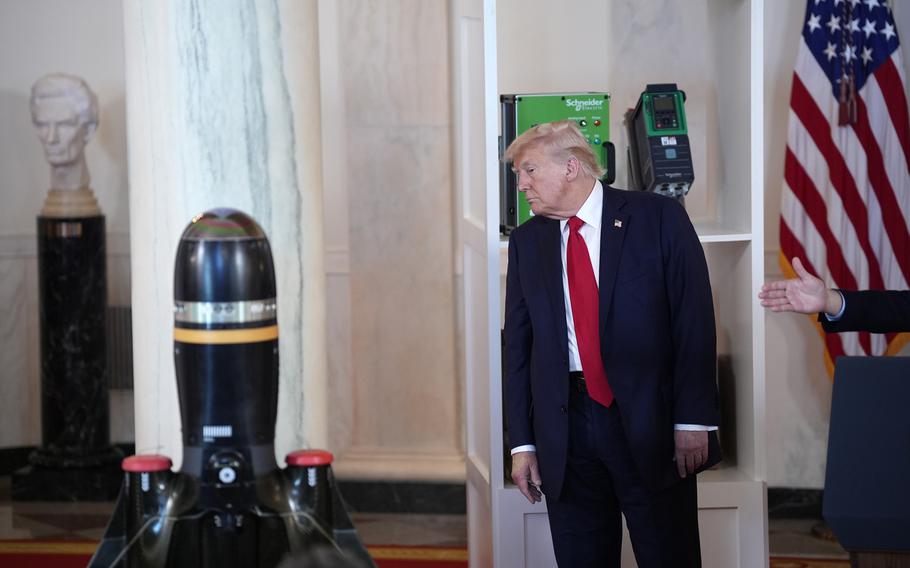
President Donald Trump looks at an Anduril drone model at the White House on April 30. (Yuri Gripas/For The Washington Post)
Meta founder Mark Zuckerberg became a billionaire by connecting people with their friends to share photos and memories. Now he wants to also connect U.S. soldiers on the battlefield to help them defeat their enemies.
The company announced on Thursday that it will work with defense technology start-up Anduril to offer the U.S. military and its allies technology for soldiers involving augmented reality and artificial intelligence software.
The venture sees a worldwide consumer brand integrated into the lives of billions of users around the globe expand into a line of business that requires picking sides.
The partners aim to “transform how warfighters see, sense, and integrate battlefield information,” Anduril said. The companies are already working on a high-tech helmet as part of a project called EagleEye, Anduril founder Palmer Luckey told the tech podcast “Core Memory.”
Meta’s new business initiative also reunites Zuckerberg with Luckey, the founder of the virtual reality company Oculus. In 2017, he left a high-profile position at the company then called Facebook, after public outcry over his $10,000 donation to an anti-Hillary Clinton organization.
Luckey built the foundations of Meta’s work on virtual reality following the company’s acquisition of Oculus for $2 billion in 2014. After leaving the company, he co-founded Anduril, one of the most prominent companies among a wave of venture-backed start-ups that has emerged as the importance of technology such as drones and AI becomes apparent on the battlefields of Ukraine.
“I am glad to be working with Meta once again,” Luckey said in a statement. “My mission has long been to turn warfighters into technomancers, and the products we are building with Meta do just that.”
Zuckerberg said in his own statement that Meta was “proud to partner with Anduril to help bring these technologies to the American servicemembers that protect our interests at home and abroad.”
Meta’s push to serve the military arrives as the company and its founder have attempted to rebrand themselves for President Donald Trump’s second term.
Since Trump’s reelection, Zuckerberg has sought to strengthen his relationship with the president with flattering public comments, private meetings and a $1 million donation by Meta to the president’s inauguration committee.
Meta has also made Republican-friendly policy changes including scrapping its fact-checking program, overhauling its content moderation strategy to be more permissive, and ending diversity, equity and inclusion initiatives.
While Zuckerberg has remade Meta, his relationship with Luckey has also evolved.
The VR entrepreneur left Facebook during Trump’s first term as president, a time when many tech industry workers and their bosses were openly wary or even dismissive of Trump.
News reports about Luckey’s donation to a group that ran anti-Hillary Clinton ads sparked backlash among Facebook employees and the wider community of virtual reality developers. He departed soon after, though neither Luckey nor the company explained why.
Andrew Bosworth, the former leader of Meta’s virtual reality efforts, said at the time that politics had nothing to do with Luckey’s departure. But Luckey told people he was fired over his political beliefs and support for Trump, the Wall Street Journal has reported.
In September, before Trump’s election victory, Luckey returned to Meta on a visit to try out the company’s latest augmented-reality-powered glasses, called Orion. Afterward, Bosworth, now Meta’s chief technology officer, publicly apologized to Luckey for his previous comments, saying in a post on X: “I’m grateful for the impact you made at the company and in developing VR overall. Looking forward to showing you more of our work in the future.”
Luckey said in an episode of the “Core Memory” podcast released Thursday that Zuckerberg didn’t fire him directly and that many of the people who made the decision have left the company.
“When every single person that conspired to get rid of me has been run out of the company, what is there really left to be truly angry at?” he said.
Among the first projects the two companies plan to tackle is the EagleEye helmet for soldiers. Luckey described it as combining an AI assistant with communications and other functions.
It will be an “ever-present companion who can operate systems, who can communicate with others, who you can off-load tasks onto … that is looking out for you with more eyes than you could ever look out for yourself, right there, right there in your helmet,” Luckey said.
Anduril and Meta said they have submitted a joint white paper for an Army contract for augmented reality devices that give U.S. soldiers “increased lethality, mobility, and situational awareness,” according to a Defense Department listing for the project.
The EagleEye system will improve soldiers’ hearing and vision by helping them detect drones flying miles away or hidden targets, the Journal reported. The project will rely on Anduril’s autonomy software and Meta’s AI models.
Luckey said that effort will build on Anduril’s work on the Army’s Integrated Visual Augmentation System (IVAS) program, in which it has partnered with Microsoft to develop an augmented-reality-powered headset for soldiers.
To aid the collaboration, Meta will draw on its hefty investments in AI models known as Llama and its virtual reality division, Reality Labs. The company has built several iterations of immersive headsets aimed at blending the physical and virtual worlds - a concept known as the metaverse.
Meta’s new venture comes after a shift in recent years that has seen Silicon Valley companies once hesitant to work with the military get comfortable with the Pentagon.
In November, Meta said it would allow U.S. government agencies and contractors working on national security applications to use its AI models. In 2018, Google declined to renew a deal to sell AI technology to the Pentagon after an employee revolt, but it now speaks proudly of military contracts and recently dropped a pledge not to apply AI to surveillance or weaponry.
Gerrit De Vynck contributed to this report.